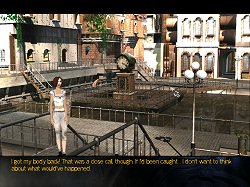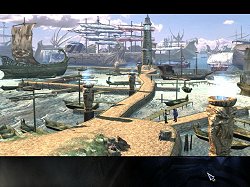|
The Longest Journey
 The Longest Journey is a tour de force, albeit not entirely flawless. It is a tale of two disparate worlds, Stark and Arcadia. The former represents science and possible dangers to our future, with more than a whiff of corruption; whereas the latter symbolizes magic and the myths of the past, together with lost ages of innocence. I can't remember a single Quest/Adventure which draws you into the story as much and as well as TLJ. Throughout 13 chapters plus a prologue and epilogue, your longest journey takes you to a variety of fantastic mythical worlds and characters, and is a memorable experience. It has a positive/strong female lead-character (a rarity in computer games), a rich story line with dashes of humour, and some biting social satire.
Your alter ego is the unwitting instrument of fusing the two worlds into a balanced synthesis and guarding the future existence of the universe ... er, universes? April Ryan is your average late-teenage girl. She could be your pal or child or granddaughter. But unknown to all, including April herself, she is endowed with the mysterious capability of "shifting" between worlds. Her character gradually matures during the game making you really empathize with her. She is unpretentious and is sweetness personified. She befriends the down-and-out and the dispossessed, and all creatures including birds and moles. This does not prevent her from having an underlying steely will which enables her to carry out hair raising exploits of derring-do. In the course of these she is not averse to tipping a vile cannibalistic wizard into his own cooking fire or harpooning a sharklike snapjaw, if essential to furthering her ostensibly vital missions. The Longest Journey is a tour de force, albeit not entirely flawless. It is a tale of two disparate worlds, Stark and Arcadia. The former represents science and possible dangers to our future, with more than a whiff of corruption; whereas the latter symbolizes magic and the myths of the past, together with lost ages of innocence. I can't remember a single Quest/Adventure which draws you into the story as much and as well as TLJ. Throughout 13 chapters plus a prologue and epilogue, your longest journey takes you to a variety of fantastic mythical worlds and characters, and is a memorable experience. It has a positive/strong female lead-character (a rarity in computer games), a rich story line with dashes of humour, and some biting social satire.
Your alter ego is the unwitting instrument of fusing the two worlds into a balanced synthesis and guarding the future existence of the universe ... er, universes? April Ryan is your average late-teenage girl. She could be your pal or child or granddaughter. But unknown to all, including April herself, she is endowed with the mysterious capability of "shifting" between worlds. Her character gradually matures during the game making you really empathize with her. She is unpretentious and is sweetness personified. She befriends the down-and-out and the dispossessed, and all creatures including birds and moles. This does not prevent her from having an underlying steely will which enables her to carry out hair raising exploits of derring-do. In the course of these she is not averse to tipping a vile cannibalistic wizard into his own cooking fire or harpooning a sharklike snapjaw, if essential to furthering her ostensibly vital missions.
The graphics, video cut scenes, voice acting, music, and SFX, are all absolutely top-notch ... and more! Although some players have experienced troubles, I did not encounter any technical problems during installation or throughout the whole game. The speech is fully subtitled in excellent English. Furthermore, almost every word of dialogue is automatically logged on the fly and can be referred to anywhere in the game. This saves a lot of frustration and superfluous note taking. You can also replay any of the 40 stunning video sequences whenever you like after they have occurred.
 The game is traditional point-and-click with 3D characters moving around exquisite 2D rendered backgrounds. It is totally mouse controlled with a clutch of function hotkeys for speed and simplicity. April can walk or run and there are maps in several locations to reduce excessive locomotion. In Stark you also ride a realistic subway train with stops at various strategic stations. There is no real 'action' to worry about, and April is never killed. TLJ is linear in that you can't move to the next chapter until you've done and got everything essential beforehand, but within most locations there are several scenes which you are free to visit in any order you like. I personally applaud this hybrid construction which makes for a taut plot and sequential puzzles; and particularly here where there are no points or beeps or other perks to indicate success. It also follows that the 4 CD's never have to be swapped. There are 99 graphical save slots enabling rapid saving and loading. Despite the serious business of redeeming the world(s) April maintains a light humorous banter, with her sidekick Bird chirping in from time to time. In this game the so called 'Non Playing Characters' really participate; they are vibrant personalities of flesh and blood (or something) and not just pegs for your heroine to act upon. The game is traditional point-and-click with 3D characters moving around exquisite 2D rendered backgrounds. It is totally mouse controlled with a clutch of function hotkeys for speed and simplicity. April can walk or run and there are maps in several locations to reduce excessive locomotion. In Stark you also ride a realistic subway train with stops at various strategic stations. There is no real 'action' to worry about, and April is never killed. TLJ is linear in that you can't move to the next chapter until you've done and got everything essential beforehand, but within most locations there are several scenes which you are free to visit in any order you like. I personally applaud this hybrid construction which makes for a taut plot and sequential puzzles; and particularly here where there are no points or beeps or other perks to indicate success. It also follows that the 4 CD's never have to be swapped. There are 99 graphical save slots enabling rapid saving and loading. Despite the serious business of redeeming the world(s) April maintains a light humorous banter, with her sidekick Bird chirping in from time to time. In this game the so called 'Non Playing Characters' really participate; they are vibrant personalities of flesh and blood (or something) and not just pegs for your heroine to act upon.
The interface is uncluttered and extremely effective. Whenever you can interact with an object or creature, the cursor highlights and objects are labelled. When an inventory item can react with anything including another inventory item it flashes.
There is one superb feature I haven't yet encountered in any other game. You can rapidly scroll forwards or backwards through all inventory items by simply pressing a couple of adjacent keyboard letters, stopping only if and when the item flashes ... this obviates a very great amount of redundant manipulative slog work. An additional uncommon facility is that by toggling another key you obtain superimposed arrows indicating all exits from any location, thereby ensuring that you don't miss that vital 'screen extension'.
Most of the game puzzles are pretty straightforward, but a few caused me to think quite long and hard. However, nearly all could be solved by logical thinking, even though some were a trifle 'unrealistic' (e.g. two puzzles involving electricity). April keeps a daily bookmarked diary which is constantly and automatically updated. This occasionally helps with the overall objectives of some puzzles without presenting spoilers. There are absolutely no sliders or mazes; no chess, combination lock, maths, musical puzzles or the like, which always infuriate some players if not others. They all fit seamlessly into the story and many are completely original ... one I liked particularly involves a magical statues-operated bush telegraph.
If, as some may feel, most of the puzzles tend to be fairly easy, this may have been intentional. The development of the lengthy story is so fascinating and absorbing that most players will impatiently want to find out what on earth (or Stark, or maybe Arcadia) happens next. They present sufficient challenge and satisfaction in solving, but don't hold up the development for too long or tempt the gamer to reach for a walkthru.
The narrative and conversations are more lengthy than in any other game I can remember. True you can keep your trigger finger near to the escape button and skip them, or parts of them, reading every word from the captions or even the conversation log replay. But this negates one of the main virtues of the game which is to immerse you fully in the intricate narrative, background and characters. Although I appreciated the extended conversations because they enriched the story so much, I am aware that there are players who might find them somewhat tedious. Be warned, on one occasion you may sit through a solid hour of continuous dialogue and cut scenes (truly! my spies have timed one such occasion with a stopwatch!). If you are the impatient type you might find yourself itching to solve a puzzle or perform any other activity and get on with the game!
 There are occasional sexual innuendos and references to drugs, drink and maybe other "vices". These are all dealt with naturally and tastefully, in a mature and never smutty fashion. I feel that anybody, young or old, would have to be excessively straight laced or blinkered against 21st century realities to take exception to anything presented in TLJ. However there is a considerable amount of hard core obscenities (an extreme case is one character's diatribes containing 30 "F" expletives). They were undoubtedly deliberately introduced in order to add authenticity to one or two of the seedy characters in Stark. April herself and the mythical creatures in Arcadia adhere almost completely to the Queen's English. The gratuitous cussing hardly upset me personally, but it did detract from the sensitive, intelligent and adult nature of the game. Apparently some folk will not even allow their children or grandchildren (or themselves) to play the game solely due to this --- a very great pity since otherwise it is admirably suitable for all ages, not the least for youngsters.
My only other (nitpicking?) criticism is the contrast between the fabulously beautiful background renderings and magnificent cut scenes, and the crudity of some of the human/animal puppets. It was also mildly disconcerting to experience the vanishing of physical objects when handled by characters, and occasional 'miming effects' (e.g. a sea captain writing with an invisible pen on non existent paper). There are occasional sexual innuendos and references to drugs, drink and maybe other "vices". These are all dealt with naturally and tastefully, in a mature and never smutty fashion. I feel that anybody, young or old, would have to be excessively straight laced or blinkered against 21st century realities to take exception to anything presented in TLJ. However there is a considerable amount of hard core obscenities (an extreme case is one character's diatribes containing 30 "F" expletives). They were undoubtedly deliberately introduced in order to add authenticity to one or two of the seedy characters in Stark. April herself and the mythical creatures in Arcadia adhere almost completely to the Queen's English. The gratuitous cussing hardly upset me personally, but it did detract from the sensitive, intelligent and adult nature of the game. Apparently some folk will not even allow their children or grandchildren (or themselves) to play the game solely due to this --- a very great pity since otherwise it is admirably suitable for all ages, not the least for youngsters.
My only other (nitpicking?) criticism is the contrast between the fabulously beautiful background renderings and magnificent cut scenes, and the crudity of some of the human/animal puppets. It was also mildly disconcerting to experience the vanishing of physical objects when handled by characters, and occasional 'miming effects' (e.g. a sea captain writing with an invisible pen on non existent paper).
The instruction manual is complete and explicit ... not just your minimal jewel case pamphlet. It also includes an intro-walkthru for anyone who might need some startup assistance. Early in the game, outside April's room, is a Free Access Terminal (F-A-C-T). It is disabled in the present versions although a simple programming gimmick has been found to partially operate this somewhat superfluous device. Also, after the finale a Book of Secrets is enabled ... a neat supplement. What's in it? Hey! That would be telling ... although (cheat!) there IS a way of accessing this Book earlier in the game.
In my opinion, definitely YES! TLJ is unique in being more of a lengthy interactive saga than merely your typical quest. The surprise endings were amongst the best ever, even though a few loose ends were left untied and there seemed to be certain ambiguities (Planning a sequel? I certainly hope so!). The overall effect was of being totally immersed in a majestic interactive epic/quest.
All in all, TLJ is a masterpiece and one of the best Adventures to be released during the past few years. (Unfortunately it should be avoided by people who are violently repelled, for themselves or their offspring, by some extremely crude language.)
Copyright © Len Green 2000.
All rights reserved.
System requirements: Minimum: Win 95 or 98, P166 MMX, 32MB RAM, 4X CD-ROM drive, Mouse and keyboard, 640x480 SVGA high color (16-bit) DirectX compatible video card with 2MB RAM, Windows-compatible sound device, 200MB free hard drive space.
Recommended: P II 266, 64MB RAM, 3D accelerator card (DirectX/Direct3D compatible) with 4MB RAM, 8X CD-ROM drive, 1GB free hard drive space
|
